
Written by: Syed Abbas Hussain
Posted on: March 10 ,2014 |  | 中文
| 中文
Sania Saeed
A veteran actor whose body of work has established her as one of the most well respected names in the business, Sania Saeed is in many ways a complete artist. Her sensitive portrayal of Mehrunissa in Sitara Aur Mehrunissa at the beginning of her television career made her a household name and she continued to emerge stronger through the powerful characters she embodied with a fiery intensity that makes her stand out from the herd. She is known to pull off the most challenging roles with earnestness. Her work in the recent series Ao Kahani Bunnay is testament to her ability to mould herself according to any given role, for she played a man and eunuch among other characters in a serious genre, a first for Pakistani television. She is also a prolific theatre actor and a founding member of the prominent Karachi based theatre group Katha. Her stint as an anchor mirrored the success of her acting career; her gut-wrenching and informative program Maa struck a chord with a large section of viewers. The actress has taken part in numerous social welfare projects and is truly a multi-faceted personality who, in spite of her formidable achievements, remains firmly grounded.
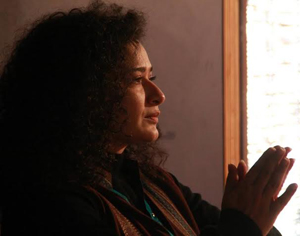 |
Youlin Magazine spoke to the talented and outspoken woman of substance whose beatific smile can melt many hearts.
Your family has a background in acting. Would you attribute your choice of career to that?
That’s the only reason why I act. If I wasn’t in that environment I don’t know if I would have found it or whether it would have found me.
Technological improvements over the years have not really translated into an evolution in the scripts of television plays, in fact there seems to be a regression in that department. Do you agree that there has been deterioration in terms of stories over the years and what would you attribute that to?
Yes the quality has gone down. Initially when television started it was a novelty. Nothing preceded television and the people working in it had very little competition. They made their own rules; they decided what they wanted to show except that the state dictated to an extent as to what was to be shown. It was licensed television and those working for it were answerable to people. When commercial television started, a group of people were making the decision with more or less no regard for public opinion or the public good. It did not matter whether it was good, what mattered was whether it was selling. When you change your position on the kind of programming that you are making, everything changes. Initially the idea behind television was to have a dialogue with the audience, and to help them rise from their present position. Commercial television however says that you feed people what they understand and doesn’t help them to rise. You will buy what you understand and what you are comfortable in. The mindset of commercial TV is that women want to watch regressive television since they are used to living the kind of lifestyle that is shown in many of our programmes these days.
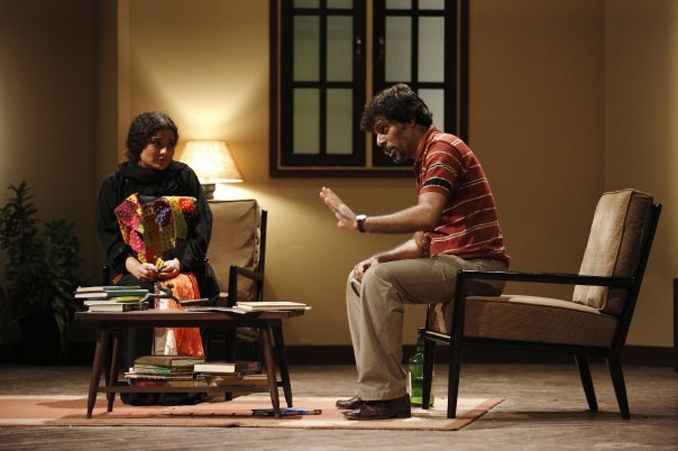 |
| Main Adakaara Banun Gi |
While the exploitation of women being shown on Pakistani television is criticized by feminists, the counter argument could be that it is merely a reflection of reality and in a way the depiction is actually creating awareness. How does one actually differentiate misogyny from realistic portrayals?
There are no rules to this. Sometimes you can narrate things better by glamourizing them, in other instances they are better portrayed realistically. It depends on how you want to tell a story and what the story leads to. Also, glamour to different people can mean different things. In my play Sitara Aur Mehrunissa, for example, Mehrunissa was the more glamorous character to me even though Sitara was the more beautiful out of the two. But the woman to be was Mehrunissa who was strong, made her mistakes, learnt her lessons, and accepted her faults. I saw girls dressed up as Mehrunissa when I was at university. I even saw that hideous haircut being sported by girls because it worked for them. Wearing ajraks, kurtas and jeans to university was considered unthinkable at that time but girls wore it because of Mehrunissa since they looked up to her.
Television should have space for all kinds of opinions. It should not put only one kind of woman out there. For every script I see myself arguing over the actions of female characters. For some scripts I am able to change things but for others I am not. The directors are just not willing to change things. There is this serial I did called Darmayan which did not do very well and some people in the field said that the play did not get the ratings because the female character was quite strong. But I feel that if the play had been marketed smartly it might have done fairly well.
How do you foresee the future of television in Pakistan with Turkish plays coming in the picture? They are fast gaining popularity in the wake of fears that they will bring the TV industry down. Will Turkish plays create competition or will they be a blow to the industry?
There is no harm in showing foreign content on television but I do see a problem in the possible intention behind that. There was always a foreign language program on PTV back in the day, whether it was Little House on the Prairie, Chips or Roots but that was never at the cost of local programs. That shows your intent towards your own people. I have no problem with Turkish plays. They saw their zenith and don’t have the same standing that they used to have. One can’t run television entirely on foreign content; original content has to be created. For a little while you can be taken in by new locations and new faces but that fixation is temporary. Mera Sultan is an example after Ishq e Mamnu of a success story but the reason for that is that the former is a historical saga, the kind that has not been seen on Pakistani television. People are watching Turkish plays mostly for their novelty but one can see that most of them are following the same formula now; the stories are almost the same. I don’t see foreign programming as a threat but I see the attitude of the people bringing in those programmes as a threat. Their goals are short-term and limited to profits. They are not sincere towards the interests of Pakistan’s television industry. Instead of investing in local programs, making infrastructure, systems like studios, editing units for them and improving the shows, they chose to import programs to make more money. This attitude is not constructive and that is the real problem.
There are countries that will not bring in goods or services from abroad which will damage their local or indigenous industries.
How do you think they are damaging the industry specifically?
I am not just alluding to the finances when I talk of damage. The way foreign content is run nowadays belittles your own artists and demoralizes them.
Once a content head said to a director that if in a Turkish play a girl runs away from her house, people love to watch it and it pushes the TRP’s (ratings). He argued that in Pakistani plays if a girl decides to run away from home if she’s being abused or wants to make a life of her own, people will judge her and call her immoral. That unfortunately is a prevailing notion but this mindset is being exacerbated by the way our content is being run. It is the job of creative people to change mindsets. Even if you’re marketers and money-making machines you will see that unless your audience grows intellectually you will make no money. However our sponsors sell products like soaps, detergents and mobiles and internet connections, and intellectual development is hardly a priority for them. They just want glamour. Even our government requires intellectual development in the country but they don’t do anything about it either. The state has hardly contributed to health care and education for instance, which are real and immediate concerns that have to be addressed. You will see that nothing is being done to make life better. That doesn’t happen with machines. Roads and bridges don’t cause growth. Selling agricultural area to expand residential areas is not growth, for example. What I’m trying to say is that we cannot isolate the television industry from a problem which exists at the structural level of our society as a whole. It is a reflection of a general attitude that exists in the country. Anything that helps in your intellectual growth is considered useless in society, since all that one tends to look for is a tangible benefit.
Mehreen Jabbar, Nadia Jamil and you have made quite a formidable team, your plays with this team, whether Aur Badalti Hai Zindagi, Putli Ghar or Kahaniyan really stood out. Do you feel the same with regards to your personal experience of working with them and in that regard can we expect you guys to collaborate in the near future?
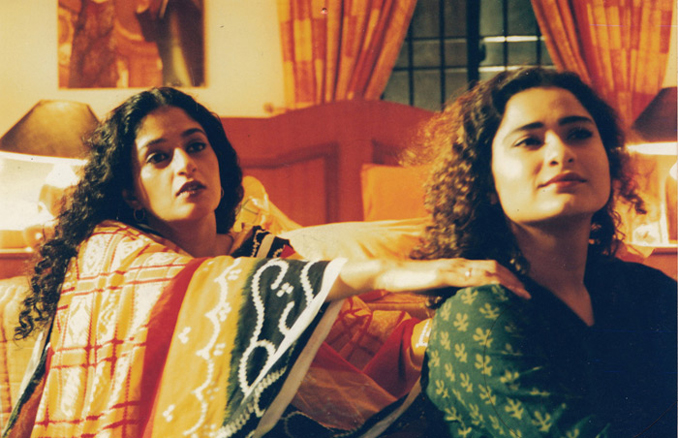 |
| With Nadia Jameel in a Mehreen Jabbar venture |
I do agree that my work with them has stood out. We keep planning on working together again but it somehow doesn’t happen. We have worked together so frequently since we all have the same wavelength and our approaches more or less also coincide. It was very good for us that we went our own separate ways, worked with different people and did our own experiments. I don’t think it happened consciously but it just happened. We would love to work together, as a matter of fact we love to meet off and on and discuss books, films and projects. Just a few days ago Nadia (Jamil) and I were sitting together and discussing how we should do a theatre project together.
How would you compare the mediums of television and theatre in terms of the craft? Which of them do you prefer?
I don’t compare the two mediums and consider it wrong to do so.
Ok so let me rephrase the question then: how are the two mediums different?
The kind of freedom an actor experiences in terms of performance on stage is just beyond words. That cannot be compared to television acting. The kind of exercise that comes with television acting is a pleasure on its own. Why actors prefer theatre generally is because of the kind of freedom they experience when they are on stage. When you are standing on stage you are the master of the world. It is an amazing feeling. I do prefer theatre to television myself.
You have recently done three acting workshops in collaboration with Olomopolo Media, please tell us about how this project came about and what your experience was like.
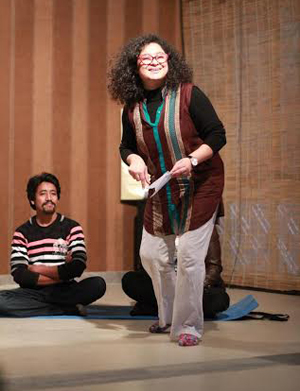 |
| At the workshop |
I have been doing workshops with another group in Karachi and I decided to do it here as well. I have known the people behind Olomopolo on a personal level, they are friends of mine and I have worked with them. I had come to Lahore for the weekend theatre festival which has been postponed indefinitely. I stayed back and Olomopolo media was formed. The Weekend Theatre Festival (WTF) office was converted into OLO Junction, where we decided we will do things that we feel for and put in our expertise, the little that we have, to facilitate people to come and do what that they feel like without having commercial restraints.
Therefore we’ve been having different workshops; for example, my husband and I did theatre workshops; Wahab Shah is doing a dance workshop soon; Sarmad Khoosat is doing a screenplay writing workshop and readings of Manto. Olo Totolo is an activity that happens every weekend for children where stories are read out to them.
How important is training in the field of acting? Considering that many people learn on the field, these days a lot of models are seen acting but in Hollywood many of the actors are trained. Does it make a difference or is it just a case of “either u have it in you or don't’’?
That saying applies to everything, right? You either have a mathematical mind or you don’t; you either have an aptitude for music or psychology or you don’t. Similarly you have to have an aptitude for acting. Training is helpful because it cuts down on your trial and error process. You will learn it eventually but you will waste a lot of time and energy and go through a lot of psychological trauma. Training saves you that stress and gives you that confidence that you require to stand in front of the camera or an audience. It also gives you the expertise to play with your character. Training helps you to learn within a non-competitive environment the areas that you need to work on. You learn about your strengths and weaknesses while you’re at it. We all have limited knowledge and in a workshop you learn to look at things differently and to think out of the box.
In your play with Katha group Khushiyon Kee Chirya, you did a play with blind children. Did that require a lot of background research and how challenging was it?
There were blind and deaf children and that is why it was so challenging since they are opposite, communication wise. We had to devise exercises on how the children would coordinate and communicate with each other when one can’t hear and the other can’t speak. We also worked on exercises to help the blind children move more freely and with confidence. My husband Shahid, the director of the project, had to plan gimmicks, exercises and workshops to help the children perform in that play and it took around four to five months to complete it. It was a very difficult and tedious task.
Where did you discover these children?
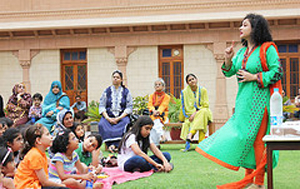 |
| Reading at Storytime Saturdays, Mohatta Palace |
There is a school in Karachi called the Ida Rieu School for the blind and deaf. They had invited us to do a theatre play with the children because at that time they needed to save the school from being closed down. The international authorities were saying that the blind and deaf children could not be kept together in hostel. They needed to save those hostels and build more hostels to create separate accommodation for the blind and deaf children. Our play was basically a fund-raiser to showcase the abilities and qualities of these children that were untapped.
They emerged from the workshop as different people and so did we.
The experience must have been emotionally toll-taking…
Absolutely. We had to be on our toes all the time and also be careful about what we said and what we didn’t. In normal conversations one says so much that one realizes while talking to a blind person is so wrong. Emotionally it took its toll on us but it has enriched us emotionally as well.
Are the plays by the Katha group always socially relevant? Do you feel that theatre ought to have a socially relevant message or would you subscribe to art for the sake of art?
I don’t believe that any art is for the sake of art; it cannot be. Anything said or done publicly has political implications or comes out of a political process even if it is inane. There is nothing which is apolitical.
All that comes out of Katha stems from our understanding of society, the way we look at different issues and sections of society and the way we want to narrate that aspect of society. They are not as politically charged and direct as Ajoka or Tehrik-e-Niswan. We use literature or other forms to convey our message.
What makes theatre commercially viable? Do financiers want a certain kind of theatre that they are willing to back?
Musicals with bling-bling definitely get more sponsors since they are easy to sell and understand. That said, finding sponsorship in theatre is about knowing the right people. It’s a skill about knowing how to sell your product. Finding sponsorships is also contingent on the extent to which you are willing to play to the gallery. The ‘Ajokas’ and ‘Kathas’ will always have problems finding sponsorships because they might not be that willing to play to the gallery, but that is a difficulty that you know is inherent to your thinking process and, hence, you are prepared for it.
In your case isn’t it different since you are a big name in the field of acting, so wouldn’t that make you a bankable individual for sponsors?
I don’t think so. The only thing that matters is: are you saying what is going to sell? If you are not it doesn’t matter who is saying it.
We’ve seen you in a lot of intense roles; would you ever consider venturing into comedy?
I have done a lot of comedy in theatre but the kind of comedy that is written for television is not in accordance with my sense of comedy. They are mostly caricatures, over the top and slapstick. I have been offered comedy but I don’t like that kind of comedy. I would not want to be a part of work that I don’t enjoy watching.
Do you think our new generation that is addicted to fast food and video games and is into instant gratification, creates the demand for mindless television or is it that producers are underestimating the intellect of viewers?
I think it’s a bit of both. There is also a widening gap between the kinds of audiences that exist. Earlier, few people owned a television set and hence the audience was limited. There was an issue of affordability at that point in time. Now there is a wider range of audience that has to be catered to, and that too round the clock, since you have to run a channel for 24 hours. You have to provide entertainment to so many people hailing from different classes, educational backgrounds, age groups and professions that it is virtually possible to cater to the choices of everyone. The makers of our television shows, I feel, have figured an easier way out by addressing only one segment of our population and continue to do so complacently.
Do you think actors should be held responsible for the roles they do, given their sociopolitical connotations. For instance if a role is condoning the oppression of women, is it an actor's responsibility to say no, considering that we are living in a society faced with pressing issues and actors are looked up to?
I think it is the responsibility of any kind of creative person anywhere in the world to take the responsibility of the story one is telling. In a story you might not be the protagonist or the positive character. You might be doing bad things but what is the story saying is something that should be pondered over. What impact is the character having on the audience’s thinking process is a thought that should be considered. My job is not to take responsibility to think about what they are going to think; I am not going to dictate anything to them. But I am going to be responsible for the questions I will put in their head.
You may also like: